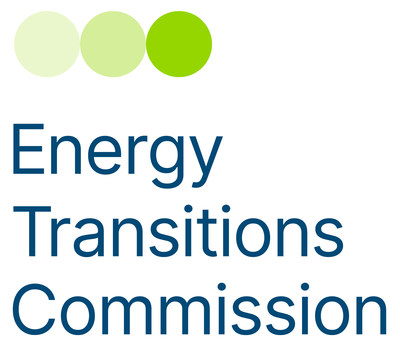Published on: Wednesday, 15 October 2025 ● 7 Min Read
LONDON, Oct. 15, 2025 -- The Energy Transitions Commission (ETC) today launches Energy Productivity: Increasing efficiency in an expanded, electrified energy system, which highlights a major opportunity for the world to more than double global GDP by 2050, while reducing final energy demand by 24%.
As global prosperity grows, so will demand for energy services, such as mobility, heating, cooling and industrial production. But the ETC's report shows that energy productivity improvements can deliver greatly expanded energy services with less energy input and dramatically reduce reliance on fossil fuels.
Growing prosperity with less energy input
Energy-based services are central to rising prosperity. By 2050, kilometres travelled by car could rise 70%; air travel by 150%; cooled floor area could grow by 150%; heated floor area by 25%; and demand for aluminium, petrochemicals, cement, and steel will all expand. Artificial Intelligence (AI) could improve efficiency in some areas, but the rapid growth of AI and data centres could add massive and highly uncertain new energy demand over the next 25 years.
But there are huge opportunities to increase energy productivity over the next 25 years, meeting this demand for increased energy services while using 24% less final energy (the energy used by appliances/vehicles) and 36% less primary energy (the raw energy resource, such as coal, oil, and gas, or wind or sunlight) than today.
"There is a major opportunity to expand energy services and deliver prosperity while using less energy overall, through widespread electrification, appliance efficiency, and smarter material use. These solutions unlock energy productivity, i.e. greater economic value from each unit of energy. If governments act now to introduce supportive policy, global prosperity can double by mid-century while using less energy overall." said Adair Turner, Chair of the Energy Transitions Commission.
Key opportunities for energy productivity improvement:
A one-time opportunity to double the pace of energy efficiency improvement
At COP28 in 2023, countries committed to double the pace of energy productivity improvement from 2% per annum to 4% by 2030. The ETC details how countries can feasibly deliver that pledge, maintaining the higher rate for around 2 decades.
Beyond 2050, as electrification of the economy approaches the highest achievable levels, the pace of improvement may fall back to around 2%, and final energy demand will grow to support further growth of energy services and GDP. In addition, electricity demand may grow faster than our projections because of rapidly growing demand for AI and "rebound effects" (the tendency for energy demand to grow when prices fall).
This makes it essential to seize all available opportunities to improve energy productivity and avoid locking into fossil fuel systems and long-term costs.
"Electrification and efficiency are the twin engines driving a competitive future. The ETC's latest report on energy productivity offers quantifiable insights—showing that smarter electric technologies and championing efficiency across every sector can deliver more with less, doubling global prosperity while reducing final energy demand by a quarter. This is a powerful call to action: let's utilize the technologies available to us today to unlock our full energy potential." said Jean-Pascal Tricoire, Chairman of Schneider Electric.
Government, business and consumer action to seize the opportunity
Governments must play an essential role in setting the policy frameworks, standards, and incentives that enable businesses and consumers to achieve productivity gains. This is a global priority, but actions will vary for governments, businesses and consumers by region:
"Doubling the global rate of energy efficiency improvements is entirely achievable. The ETC's report highlights the key actions: rapid electrification of transport and buildings, major efficiency gains in appliances and equipment, and greater material recycling. With strong government action, the COP28 energy efficiency target can be delivered, cutting emissions while enhancing energy security, affordability and competitiveness all at the same time." said Brian Motherway, Head of the Energy Efficiency and Inclusive Transitions Office at the International Energy Agency (IEA).
The briefing launches ahead of COP30 in Brazil, where new country pledges will be assessed against the COP28 pledge to double the annual rate of energy efficiency improvements by 2030. This briefing shows how this target could be achieved for the next 20 years.
Energy Productivity: Increasing efficiency in an expanded, electrified energy system was developed in collaboration with ETC members from across industry, financial institutions, and civil society. The Energy Transitions Commission is a global coalition of leaders from across the energy landscape committed to achieving net-zero emissions by mid-century. This report constitutes a collective view of the ETC; however, it should not be taken as members agreeing with every finding or recommendation. ETC members have not been asked to formally endorse this report.
Download the insights briefing: https://www.energy-transitions.org/publications/energy-productivity/
For further information, visit: https://www.energy-transitions.org
Video: https://mma.prnewswire.com/media/2795910/Energy_Transitions_Commission.mp4
Logo: https://mma.prnewswire.com/media/1275002/5558959/Energy_Transitions_Commission_Logo.jpg

![]() View original content:https://www.prnewswire.co.uk/news-releases/new-etc-briefing-energy-productivity-improvements-make-it-possible-to-double-gdp-while-reducing-energy-demand-by-a-quarter-302583901.html
View original content:https://www.prnewswire.co.uk/news-releases/new-etc-briefing-energy-productivity-improvements-make-it-possible-to-double-gdp-while-reducing-energy-demand-by-a-quarter-302583901.html

No comments posted
© 2019 KIVAA Group | All right reserved. www.theindustrial.in
Leave a reply: